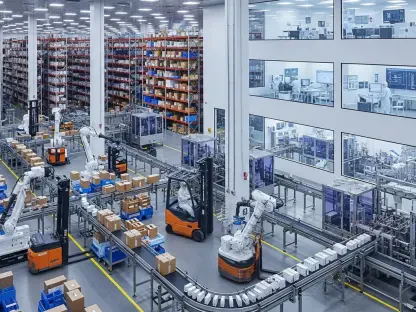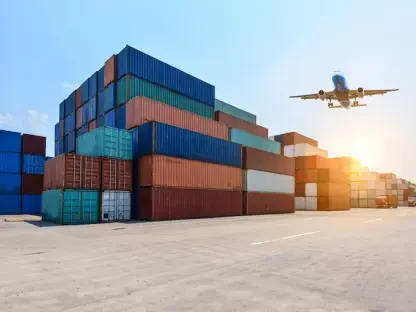In the logistics and supply chain industry, efficiency dictates success, and streamlined operations mark the difference between on-time deliveries and costly delays. Enter the CtrlChain Shipper Transport Management System (TMS), a cloud-based SaaS platform designed to address the complexities and fragmentation characteristic of logistics environments today. With multiple stakeholders and diverse transport modalities across global markets, the need for a cohesive, reliable system is more pressing than ever. This review delves into the evolution, features, and performance of this innovative technology, highlighting its potential to significantly transform logistics operations.
Understanding the Logistics Management System
Logistics Management Systems (LMS) form the backbone of modern supply chains, offering integrated solutions that harmonize various elements from carrier setup to compliance. Emerging from the necessity to manage increased global trade complexity, LMS platforms like CtrlChain’s TMS have carved out a crucial role in managing logistical functions seamlessly. By centralizing the management of transport processes, these systems ensure data consistency, operational efficiency, and traceability, supporting businesses in navigating competitive landscapes.
The broader technological landscape has embraced logistics management with open arms, recognizing its potential to revolutionize supply chain operations. Positioned at the intersection of technology and logistics, solutions like CtrlChain TMS bring advanced features to traditionally siloed environments, thereby fostering a collaborative approach that was previously difficult to achieve.
Exploring Key Features
Real-Time Visibility
One of the standout features of CtrlChain’s TMS is real-time visibility, achieved through advanced telematics, geofencing, and mobile apps. This feature allows companies to monitor shipment progress continuously, facilitating swift responses to changes and enabling proactive decision-making. The performance metrics associated with real-time visibility illustrate a marked improvement in supply chain efficiency, reduction in lead times, and enhanced overall control over logistics networks.
Carrier Management
Carrier management is another cornerstone of the CtrlChain TMS, streamlining interactions with logistics partners through independent or collaborative onboarding. By allowing shippers to manage their own carrier networks or work with CtrlChain’s vetted partners, the platform offers flexibility and control over workflows. This robust feature plays a vital role in managing varied logistics operations such as FTL, LTL, groupage, and parcel shipments, adapting to diverse transport requirements and ensuring that logistics run smoothly.
Recent Developments in Logistics Technology
Innovations in logistics technology are reshaping the industry, with the CtrlChain TMS at the forefront of these developments. New advancements focus on seamless integration of multimodal transport support and infrastructural ownership, ensuring that logistics systems are scalable and responsive to diverse market needs. These innovations empower logistics operations to scale effortlessly, regardless of business size, improving efficiency without necessitating expensive integrations.
Emerging trends indicate a growing shift within logistics environments toward automating procurement processes, driven by the need to streamline supply chain functions. Such trends not only demonstrate the adaptability of logistics technologies to evolving market demands but also highlight the increasing importance of automation in driving effective logistics management.
Real-World Applications
In real-world settings, CtrlChain’s TMS has shown its mettle across a range of industries, from retail to manufacturing. For instance, many small road freight operations in Europe and the U.S. leverage the system’s flexibility and scalability, demonstrating its capacity to support fragmented logistics marketplaces. The healthcare sector has also benefited, utilizing the platform’s capabilities to maintain precise control over sensitive shipments, ensuring timely delivery and compliance.
Unique use cases are emerging as businesses experiment with adapting the system to specific industry needs. Such adaptability ensures not just increased efficiency but also enhanced operational consistency, positioning businesses to better serve their customers in rapidly changing markets.
Challenges and Limitations
Despite its numerous strengths, logistics management systems like CtrlChain’s TMS face inevitable challenges. Technical complexities and regulatory hurdles are occasionally stumbling blocks to widespread adoption. Market dynamics, specifically among small logistics firms, often necessitate strategic shifts to fully leverage technology.
Development teams are actively working on refining integrations and improving scalability features further to address these limitations. By focusing on continuous updates and maintaining flexibility, they aim to overcome these obstacles, fostering deeper adoption and smoother operation across varied logistics landscapes.
Future Outlook of Logistics Management Systems
Looking forward, the trajectory for logistics management systems is bright, reflecting continual technological advancements. Key areas of development include more sophisticated features that incorporate artificial intelligence and machine learning, automating processes with precision and accuracy. The prospect of blockchain integration also promises to enhance transparency and security in logistics activities, addressing current limitations.
In the long term, logistics management systems like CtrlChain’s TMS are poised to redefine logistics paradigms, offering businesses not only operational control but also strategic insights that drive growth. The future will likely witness these platforms becoming indispensable tools, fully integrated into logistics ecosystems worldwide.
Conclusion
In summary, CtrlChain’s Shipper TMS stands out as a comprehensive solution that seamlessly integrates transport management functions into a single cohesive platform. It enhances visibility and control over logistics networks, proving invaluable to a range of industries. The system’s ability to scale while maintaining performance facilitates proactive management and adaptability to evolving needs. Looking ahead, as advancements continue, such logistics management systems seem poised to become central to supply chain operations, promising a more efficient and responsive logistics landscape.









